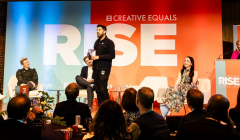
Are we leaving men and boys behind?
At Creative Equal’s RISE event, industry leaders consider how to reframe boys and men in marketing

MRSpride’s event explored the power of agency, the importance of partnerships and of telling marginalised stories in mainstream culture.

“I think communities and values might be important lifeboats to reach for at this time.” These were the words with which Michael Brown opened MRSpride’s virtual event, setting out to explore advocacy, representation and insight.
Brown, who is Chair of MRSpride and Head of Insight at UM spoke passionately and eloquently about the situation that many marginalised communities find themselves in at the moment, calling this a time of “reappraisal and repair.” He highlighted the degradation of trans rights in the UK and around the world, calling on allies and members of the community to “use the influence we have, however significant or modest,” to bring about change.
The mood that underpinned his opening remarks was one of hope, of the solidarity that is taking root across the industry. He believes that the crisis has afforded us “the space and stillness to focus on what is right and what is overdue,” something the event’s speakers set out to do.
For me, what was more important was my agency being taken away.
Shahmir Sanni
Brown started by interviewing Shahmir Sanni, a campaigner and whistle-blower. Pakistani-born Sanni volunteered on the Vote Leave campaign after graduating. Having grown up in Karachi with a very different idea of what politics was, Sanni says he thought “politics was just and safe in Britain.” He acknowledged his naivety, revealing that he was intrigued by the possibilities the Vote Leave campaign offered, particularly since he felt there was a lot of Euroscepticism within the BAME community.
It was only once he was embedded in the team that Sunni realised the organisation was circumventing spending laws and, he said, arguably committing one of the largest instances of electoral fraud this country has ever seen. He turned whistle-blower. But, having thought he would be listened to and respected, he revealed that the government worked with the media to silence him; “it is inherently British to use the media to silence dissent,” he explained.
At the time, Sunni had not come out to his family; but as he explained the Vote Leave press release orchestrated by Dominic Cummings effectively outed him. It was, he said, a horrendous moment on many levels but predominantly, he explained, “for me, what was more important was my agency being taken away.” He believes that across the world, there is a “desensitisation of white communities to brown lives.”
He urged allies to dig further into research and to educate themselves as broadly as possible and then use that education to inform those around them’ particularly family members who may hold different views. Sunni advised people not to move to anger but rather embrace the fact that “your role becomes to stop these relatives from being radicalised to the other side.”
It really pays to find an ally and seduce them with your desire to help.
Lucy Crotty
Lucy Crotty, Cultural Insight and Strategy Lead at ITV shared how the broadcaster set out to future proof the Loose Women show. Explaining how the show is particularly unique on mainstream TV for its all-female line-up and the fact that some of those women are over-50.
For her, Loose Women is about using “mainstream vehicles as stealth Trojan horse vehicles to tell marginalised stories.” It was about including some typically provocative discussion topics, “in amongst the giggles.” The channel and Crotty’s research saw them examine both culture and semiotics to ensure that all the programme’s viewers felt seen. Ultimately, for Crotty, success involved discovering who she could rely on: “It really pays to find an ally and seduce them with your desire to help,” she added.
The importance of partnership was also key for Sophia Papadopoulos, Business Analyst at Kantar and Linda Riley, Publisher at DIVA magazine. The duo unveiled the research they’d conducted to produce The DIVA Survey: LGBTQI Women’s Insight 2020. The survey was commissioned for Lesbian Visibility Week as both organisations realised this was an under-researched and under-represented group.
We need to know what’s going on in our community to implement change.
Linda Riley
The survey had over 1,400 female respondents and the team partnered with Stonewall for the questionnaire phase. The primary reality the survey highlighted was that every woman’s experience is different. But what it also revealed was how unseen LGBTQI women feel across media and culture; 79% of LGBTQI women feel gay men have more visibility than they do.
It also uncovered the disparity between age groups. Of those aged between 16 and 24, over 50% were likely to have out at 18 or younger. Sadly, it is this age group that are less likely to be out at work; they essentially go back in the closet on entering the workplace. Of the overall group of respondents, three in four were open about their sexual orientation to their work colleagues but 27% have been made to feel uncomfortable in the workplace in the past as a direct result of their sexuality.
Riley was optimistic however, calling this survey an important benchmark. As she explained, “we need to know what’s going on in our community to implement change.” As to her own desire for the survey to take place, it reflects the advocacy and important work she has done over the course of her career: “I feel we’re on the right side of history if we speak out.”
Visit the MRSpride website to watch the event back in full.
Looks like you need to create a Creativebrief account to perform this action.
Create account Sign inLooks like you need to create a Creativebrief account to perform this action.
Create account Sign in